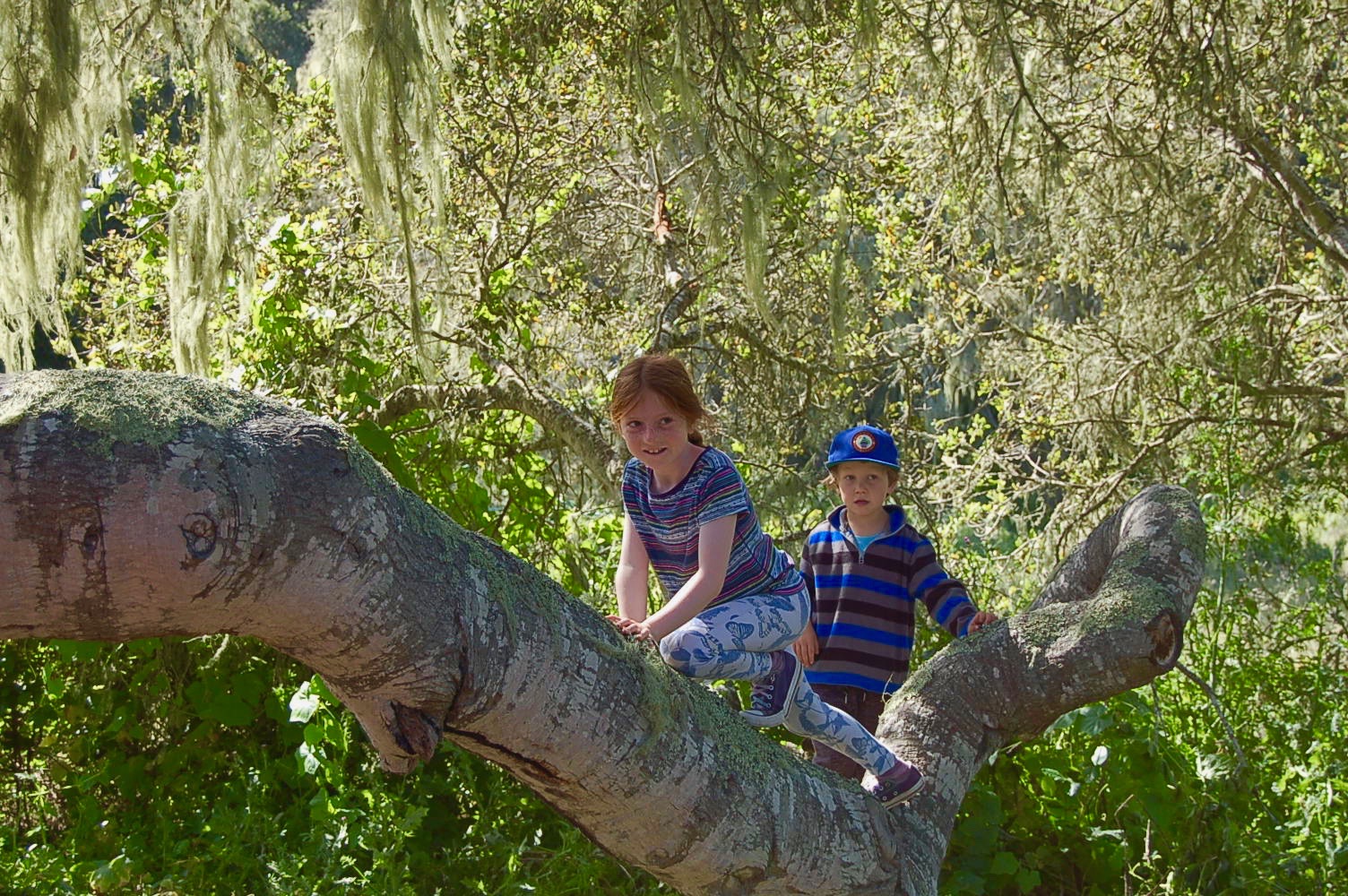Minutes after we stepped out of the car, my daughters ran off, and I suddenly lost the urge to grab their hands and pull them towards me. The city buzz and traffic began to slip away, and the toys they were playing with in the car got tucked into the trunk. Crane flies now danced around the lighted tents as the warm spring day faded to a cooling dusk. The kids started to gather twigs and lace lichen to create impromptu foraged art.
If you take away screens, kids gain the ability to “explore and learn new things at every step, to ask questions or be forced to figure it out,” said Nick Jekogian, the founder of the Walden Gathering.
We came to Monterey for a Walden Gathering, a new kind of salon in nature whose goal is to bring together a small, diverse group of people around global issues to facilitate deeper thinking and new solutions. The May 12-13, 2018 gathering prompted a dozen thinkers, including my daughters, ages 5 and 8, and another participant's 5-year-old son, to engage over questions about the importance of connecting children to nature.
While past generations offered kids free range in our neighborhoods and natural areas, our current culture limits childhood freedoms. The result is an epidemic of obesity, diabetes, stress and widespread incidence of what author Richard Louv calls “nature deficit disorder.” This disconnection also means that in the future there could be fewer advocates for the environment, which jeopardizes the health of the planet.
Christoff, one of the participants, observed that kids in nature “... don’t need toys. Kids can go outside and find things to play with. They have freedom for their minds to evolve in a creative way.” If you take away screens and the confines of a house or fenced-in yard, kids gain the ability to “explore and learn new things at every step, to ask questions or be forced to figure it out,” said Nick Jekogian, the Founder of the Walden Gathering.
As night fell, distant bird calls were the only audible sounds, prompting insights into the power of silence and reflection. Nicole, another participant, acknowledged that the peacefulness of nature can be creepy at first when we are so accustomed to noisy environments, “but let’s study the sounds we hear in nature and what we hear in ourselves from being in the quiet.”
Morning brought new energy to the gathering, and our group set off on a loop trail hike designed with the advice of Google Cities engineers who found that 56 minutes is the ideal amount of time to change one’s mindset. One of the challenges of the Walden Gathering is to name all the estimated one million trees on the property. Each of the kids chose a tree to name, and fastidiously attached hand-printed nameplates to their new arboreal friends. Jekogian told us that he hopes this process will inspire people to protect them. “If you name a tree, you don’t want to cut it down,” he said.
Clinging to the branches of a coastal live oak, the kids tracked the paths of bark-boring insects, traced the outlines of shelf fungi and challenged themselves to climb higher. Through their play, they started to learn the rules of nature, which Dominico, another participant, said is the foundation of staying safe. “Kids have to learn that when nature hurts you, it’s because you’re not paying attention to the rules. Nature will always win,” he said. Yet our culture tries to shield kids from all possible dangers instead of equipping them with the skills and confidence to navigate the environment. As Alexander, the five-year-old, stretched out his arms to advance further out on the branch, he announced: “I have no fear at all!”
Every Walden Gathering concludes with a findings book that captures the common themes and future goals of the conversation. We invite you to explore the Connecting Kids to Nature findings book.
Common Themes and Gathering Goals
Risk-taking happens in nature for both kids and parents.
When kids follow nature, they follow the truth.
You have more energy when you’re in nature.
Kids have conscious interaction in nature that can have a deeper influence and help people to think outside the box.
Nature promotes imagination.
Kids create worlds and buildings from the trees and plants.
Kids need more spaces to roam like the Utah “Roam Free” law now allows.
Hunting for plants and identifying them gave the kids better focus.
Nature releases the barriers that usually surround kids.
Nature promotes new connections with plants, animals, and people.
We need more community building for children and adults.

